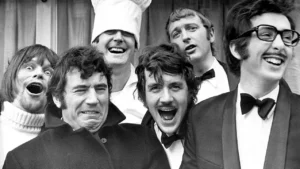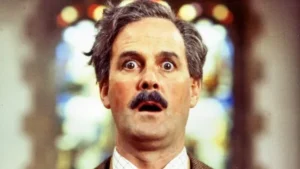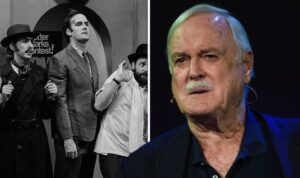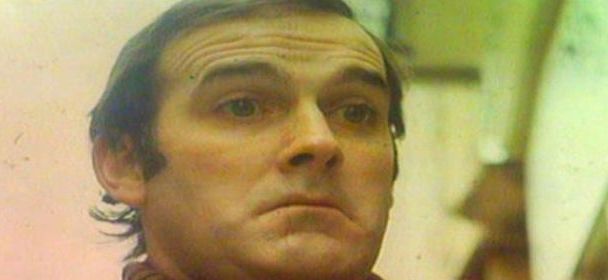In the 1996 movie That Thing You Do!, a young drummer crosses paths with his idol, a renowned jazz pianist, during a night of heavy drinking.
The young man’s band is riding high on the charts and gearing up for their national television debut, basking in their moment of glory.
However, the legend urges caution, sharing his experience that no band he’s been part of has managed to endure for long.
Despite the drummer’s assertion that his band possesses something “unique,” the older man simply shrugs. Regardless of how extraordinary a group may be, their days together are ultimately limited.
The reasons for their eventual breakup, whether it’s money, fame, or relationships, don’t change the inevitable outcome. Regrettably, even the most remarkable comedy troupes are not immune to the eventual dissolution.
Monty Python undeniably ranks among the finest. Formed in 1969, the sextet comprising John Cleese, Graham Chapman, Michael Palin, Eric Idle, Terry Jones, and Terry Gilliam was brought together by the BBC.
They had previously collaborated in various combinations on mid-60s sketch comedy series such as The Frost Report and Do Not Adjust Your Set. Their collective vision came to fruition with Monty Python’s Flying Circus, a seminal milestone in television history.
Departing from the conventional setup-punchline structure, each episode of Flying Circus featured a surreal, eclectic blend of comedy genres, encompassing wordplay, slapstick, absurdity, and music, all interconnected by incongruous animations.
Nothing quite like it had ever graced television screens, and nothing comparable has emerged since.
The series yielded three nearly flawless seasons, brimming with sketches and moments that have profoundly influenced countless comedians.
However, they ventured into a fourth season without one of their key contributors, and that marked a turning point.
There’s been an argument that John Cleese played a pivotal role in the group’s formation from the very beginning. The BBC extended offers for a show to the team of Jones, Gilliam, Idle, and Palin, while simultaneously presenting another show to Cleese and Chapman as a pair.

Initially hesitant about a two-man show, Cleese decided to bring in Palin, with whom he had collaborated previously. Palin, in turn, enlisted Jones, who then brought Gilliam into the mix, culminating in the formation of this comedic ensemble.
Although they often worked in pairs, like Cleese with Chapman and Jones with Palin, with Idle and Gilliam working individually on cartoons, the group constructed their final scripts through a remarkably egalitarian and democratic process.
If a concept was funny, it made the cut; if not, it was discarded. With minimal interference from the BBC, the Pythons were free to explore uncharted comedic territories.
Each member of the Python troupe showcased their unique style, and the merit-based writing system, coupled with a notable absence of ego, allowed them to capitalize on their collective strengths.
While all the Pythons displayed impressive versatility, it quickly became evident where their respective talents lay. Palin excelled in roles as the put-upon dweeb or the slimy character, while Jones was the go-to choice for portraying the pepperpot old ladies.
Cleese carved out a remarkable niche as the stern voice of authority, a role he executed with precision, irrespective of the character or scenario. Assisted, certainly, by his towering stature among the cast, Cleese infused each character with an unmistakable air of superiority.
In his finest moments, his stern countenance would gradually reveal fractures, unleashing pent-up rage.
However, Cleese also excelled as the “straight man,” delivering absurdity through an unwavering, stone-faced facade, while his counterpart quivered in a mixture of fear and anger.
Cleese’s mastery of this type of role transformed already brilliant scripts into comedic masterpieces.
Take the “Cheese Shop” sketch, for example; while it’s priceless on paper, Cleese’s performance elevates it as you witness his temperature rise, degree by degree, with each passing moment.
Having a legendary performer like Cleese in the lineup could have easily led to him dominating every episode.
Also Read: The Cheers Legacy: An Introduction

Fortunately for the Pythons, they were blessed with five other writers and actors of equal talent, and Cleese’s fiery characters seamlessly melded into the ensemble.
Of course, there were occasional off-episodes and skits that didn’t quite hit the mark – such is the nature of comedy, even for the most esteemed artists.
However, when everything clicked, Flying Circus reached unparalleled heights. The finest episodes buzzed with a unifying energy, even when individual sketches seemed disconnected.
Some sketches did, indeed, tie together, like the first-season effort “You’re No Fun Anymore,” which wove a single narrative through a series of linked skits.
The crux of Flying Circus’ success lay in achieving a delicate balance. When they harmonized the diverse influences and energies, the show soared. An excess of one element, or a deficit of another, could easily throw an episode off-kilter.
It’s a testament to the Python’s talent that such imbalances rarely occurred.
Often, these elements aligned perfectly: the third-season episode “The Money Programme” piled lunacy upon lunacy, culminating in the “Argument Clinic,” arguably one of the best-written sketches ever.
Yet, even that sketch was abruptly cut short by more bewildering chaos, leading to the episode’s recurring gags collapsing on themselves before concluding with an abrupt cut to black.
However, after the conclusion of the third season, this delicate balance unraveled.
The Pythons had initially embarked on the mission to create an entirely unpredictable and unclassifiable show, but John Cleese began to feel that their innovative spark was waning.
When the group regrouped for their fourth season, Cleese opted not to join them.
It was the first time the true fragility of that balance became evident. To be clear, the other five Pythons are exceptionally skilled comic writers and actors.
Nevertheless, the six episodes of Circus’s fourth season vividly demonstrated how crucial it was for the group to function as a complete unit.
Without Cleese serving as the stern and cold center, sketches drifted aimlessly and lost their momentum.

Silly concepts failed to find the solid ground necessary for humor to take root.
The low point arrived in the penultimate episode titled “Mr. Neutron.”
In a manner similar to what they attempted in the first season’s “You’re No Fun Anymore,” the Pythons aimed to construct a narrative through a series of sketches, revolving around the title character (Chapman), an all-powerful villain who appeared more interested in gardening and local gossip than obliterating galaxies.
The narrator assured us of his galaxy-destroying capabilities, but he seemed more preoccupied with redecorating his den.
On the surface, it sounds amusing. However, the concept failed to coalesce, primarily due to the haphazard and bizarre nature of the characters.
Eric Idle spent the majority of the episode hunting down a CIA agent humorously named Salad, with Idle insisting to strangers that he wasn’t in search of a salad.
Michael Palin’s American general fixated on his own body odor, while the Prime Minister of England seemingly had an Italian restaurant in his office.
It was all undeniably zany, but the episode meandered from one eccentric concept to another, hovering around jokes without landing any.
There was a noticeable absence of an edge, lacking a central focal point for the episode to orbit around. Like “The Money Programme,” it concluded with an abrupt, fourth-wall-breaking nod to the audience, but it felt wearisomely tired.
“Mr. Neutron” was a comedy engine running on empty.
Following the six-episode fourth season, the Pythons decided to call it quits.
Fortunately, all was not lost. They quickly regrouped, setting their sights on the silver screen. With John Cleese back in the mix, the equilibrium was restored, leading to the creation of a series of iconic films.
Today, those fourth season episodes are largely relegated to the obscure corners of their history; the escapades of Mr. Neutron have been overshadowed by the more memorable high points, and rightly so.
It’s astonishing to witness how the show utterly disintegrated without Cleese. Once again, the issue boils down to the delicate balance.
I believe that if any of the six had departed, the outcome would have been much the same. The Flying Circus required all six of its pilots to take flight, and with just one taken away, the entire endeavor came crashing down.
Also Read: Game Night: Family Feud


